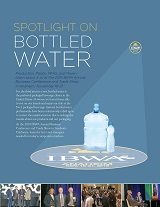One of the simplest things that a person can do when seeking to lead a healthier lifestyle is to drink water instead of other beverages that are heavy with sugar and calories. If someone wants to eliminate or moderate calories, sugar, caffeine, artificial flavors or colors, and other ingredients from their diet, choosing water is the right choice – whether from the tap, filtered, or in a bottle.
While well intentioned, a recent New York Times article, “No, You Do Not Have to Drink 8 Glasses of Water a Day,” provides a confusing and misleading narrative that might discourage people from drinking water, which is not in the public interest. While the author’s examination of whether people need to consume eight glasses of water a day is interesting, he calls into question the benefits of drinking water. Multiple studies have shown that water contributes to optimum physiologic functions, including gastrointestinal, kidney, and heart processes. Water also has an important role in preventing certain health issues, including obesity, diabetes, and kidney stones.
While there is no formal recommendation for a daily amount of water people need, according to data presented in a National Academies of Science (NAS) report, as part of their total water intake from food and beverage sources, men are adequately hydrated by consuming 125 ounces of fluids and women at a level of 91 ounces. (Dietary Reference Intakes for Water, Potassium, Sodium, Chloride, and Sulfate, 2004) The report noted that about 20 percent of total water intake is derived from food. So, the amount of water that a person should consume daily, from water or other beverages, actually exceeds the general guidance to consume eight, 8-ounce (64 ounces) servings of water each day.
In its most recent guidance (2010) the European Food Safety Authority (EFSA) also stated that the contribution of food to total water intake represents about 20 percent in adults. On this basis, EFSA recommends that male adults should about drink 2 liters (68 oz.) per day, and female adults about 1.6 liters (54 oz.).
The author’s claim that, “You also don’t need to worry so much about never feeling thirsty” is contradicted by extensive and ongoing hydration and dehydration research led by Lawrence Armstrong, Ph.D., of the Human Performance Laboratory at the University of Connecticut. Dr. Armstrong notes that by the time your brain signals that you are feeling thirsty, you are in fact already mildly dehydrated. His research notes that even mild dehydration (1-2 percent) can influence mood and cognitive function in men and women.
While it may be true that the majority of people are not walking around dehydrated all day, water consumption versus the consumption of other beverages is still a very important issue to focus on for supporting the health of Americans. National Health and Nutrition Examination Survey (NHANES) data shows that older adults are not consuming enough water and neither are children. Based on this data, research shows that water accounts for only 29 percent of children’s total fluid intake; the majority coming from soda, sports drinks and teas. Also, of children 4-8 years, 75 percent failed to satisfy the Dietary Reference Intakes (DRI) for water.
According to the Institute of Medicine and the American Journal of Preventative Medicine, one-third of American adults are overweight and another one-third is obese. And, over the last 30 years, children’s obesity rates have climbed from 5 percent to 17 percent. Poor dietary choices play a big role in these numbers and drinking zero-calorie beverages, such as water, instead of sugary drinks is regularly cited as a key component of a more healthful lifestyle. Promoting greater consumption of water from all sources, including bottled water, will support the efforts of communities striving for a healthier lifestyle.
While water is present in many foods and other beverages, scientists who specifically study hydration and nutrition are clear: drinking water is the best and most healthful way to maintain proper hydration and promote overall optimal physical wellbeing. In fact, the author of the article stated that he recommends water as the best beverage to consume. On that we can agree.



























